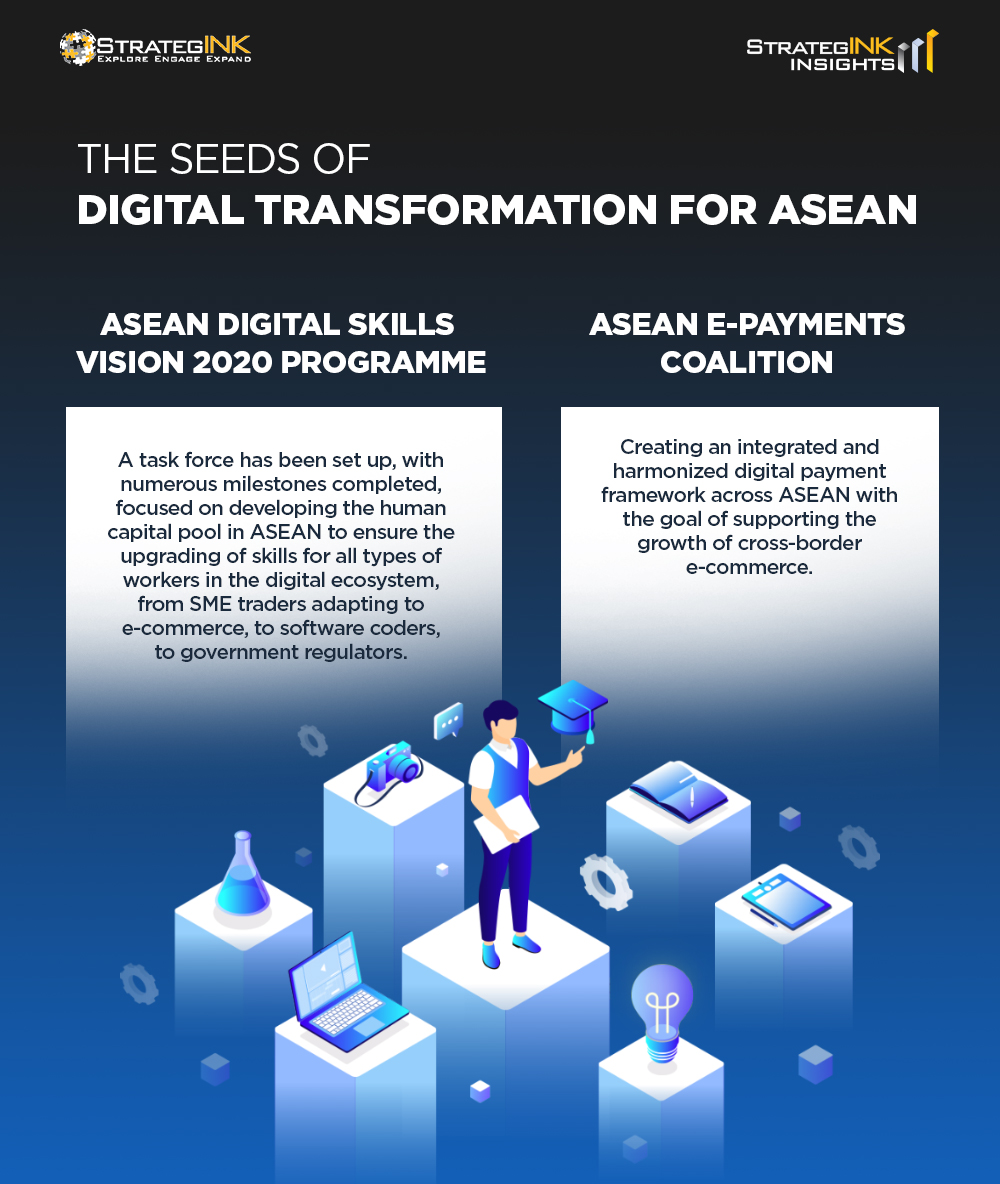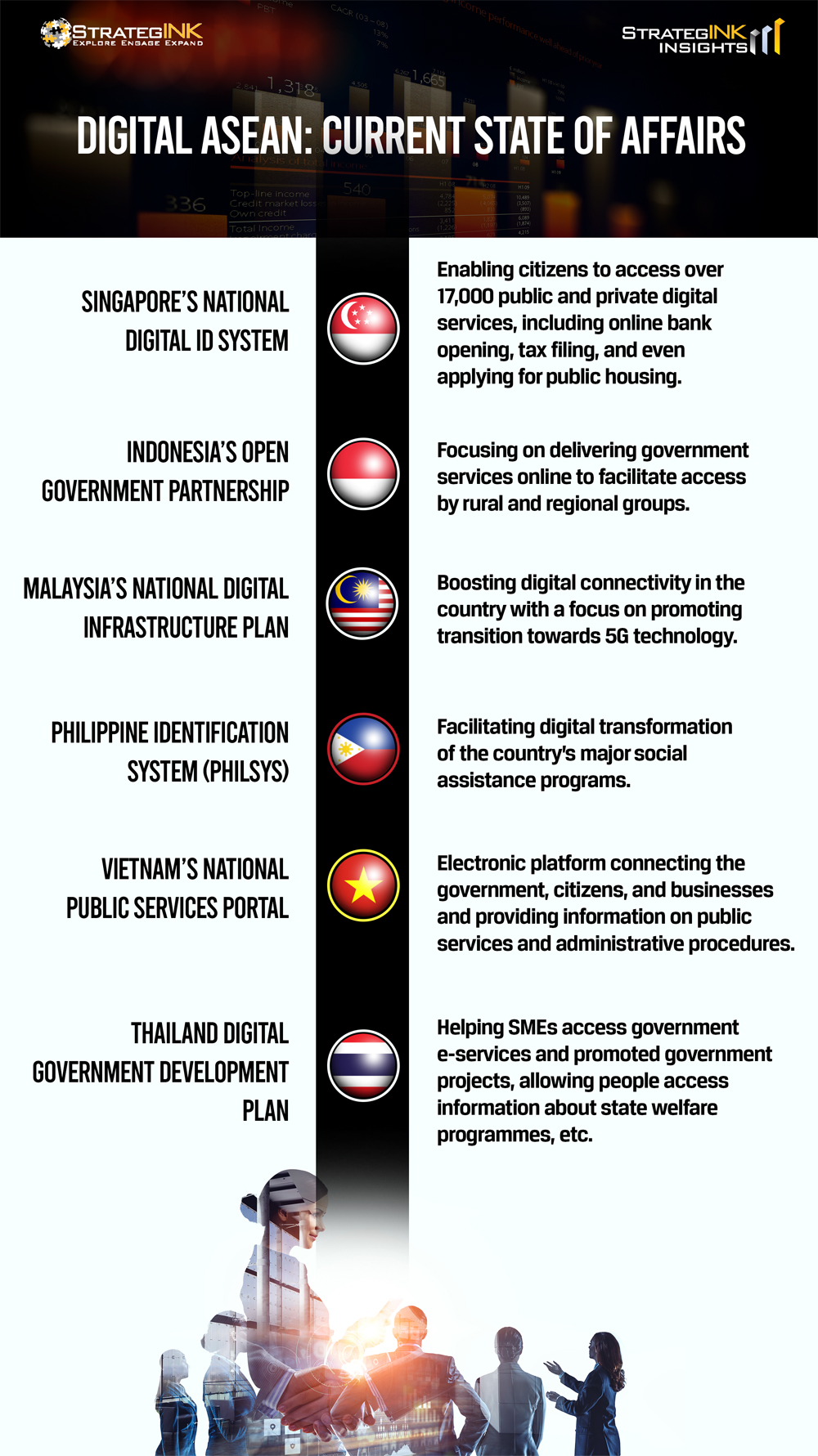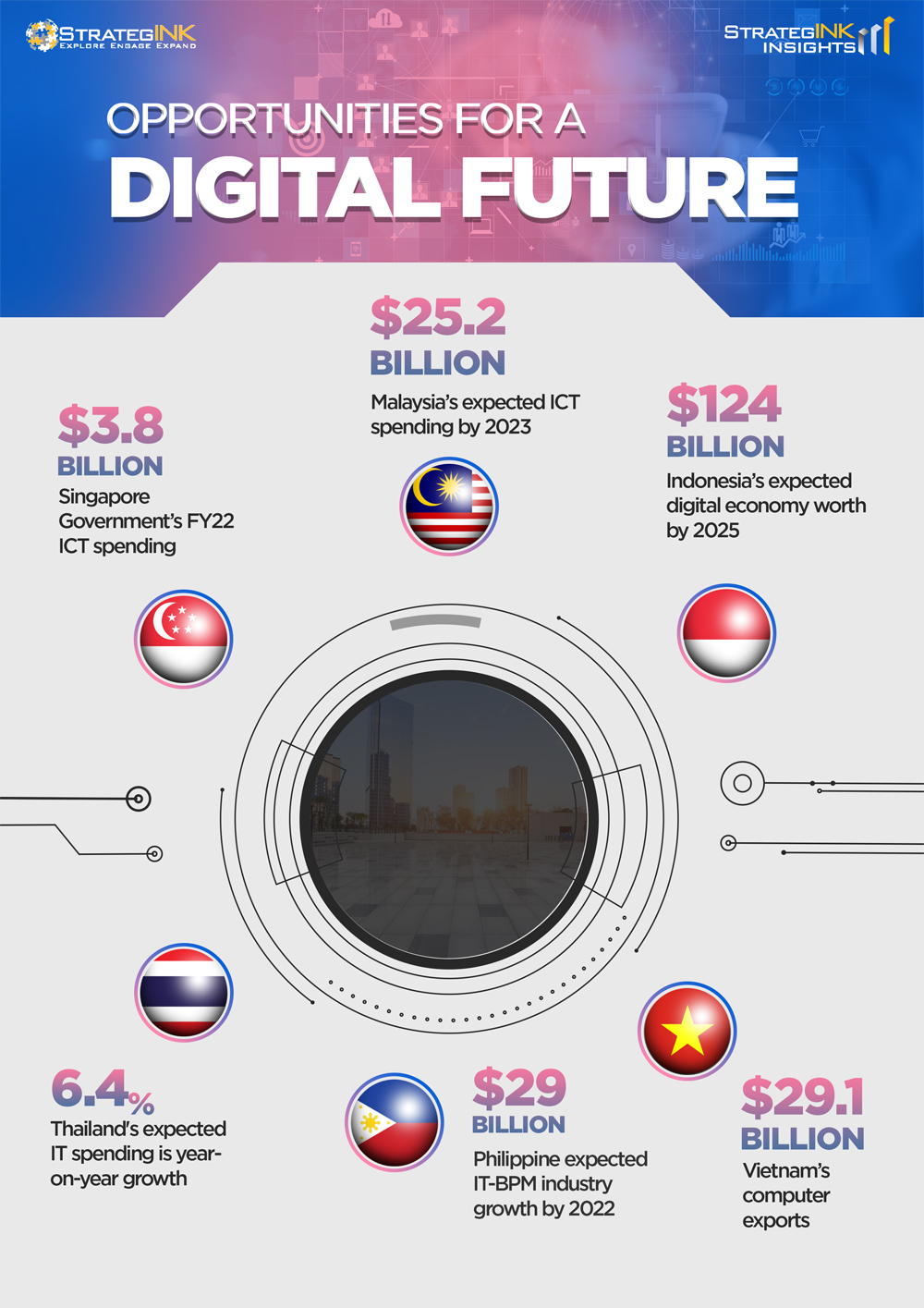
The digital revolution has been a key priority for most geographical forces across the globe. Stemming from the need, opportunities and landscape, the Association for South-East Asian Nations (ASEAN), is all set to transform itself into a digital economy. With a combination of forces including the flourishing economy, increasing literate population and internet users, deepening of reliance on technology amongst the citizens, accelerated with the unleashing of the pandemic, ASEAN today is well ripe to become one of the top digital economies, keeping pace with other world leaders. This article will focus on understanding the digital journeys of the 6 countries in ASEAN, namely Singapore, Malaysia, Indonesia, Philippines, Thailand, Vietnam.
One of the key advantages for ASEAN to emerge as a global leader stem from its diversity of people, thoughts, ideas and backgrounds. One of the major benefits comes in the form of potential for investments, especially, in the technology, research and innovation space. Most investors find a myriad of opportunities when it comes to investing in the region, leading to more complementarities than many homogeneous countries. Furthermore, the diversity of thought facilitates higher innovation. Finally, individuals from different ASEAN countries bring unique capabilities which compliment one another to facilitate holistic being and development. Therefore, diversity of ASEAN, if leveraged effectively, can be the greatest enabler for a digital future.
The seeds of digital transformation for ASEAN
As mentioned above, ASEAN’s move towards digital transformation and becoming a leading digital economy has been influenced by several factors. One of the major motivators has been the economic impact of transforming into a digital economy. Research shows that leapfrogging to a digital economy has the potential of adding an estimated $1 trillion to regional GDP over the next ten years. This economic potential comes from its position as a growing internet market and an exponential surge in the number of internet users everyday.
However, while there is immense economic potential, the impact of the pandemic of 2020 is far from over. Fortunately, digital transformation is being seen as a key force to reverse the impact. According to a study by World Economic Forum, 85% of respondents see digitalization as being
either very important or important for economic recovery, moving in the direction towards a digital economy.
Furthermore, factors like increased smartphone penetration, growth in internet users, a well-developed IT cluster, etc. in ASEAN, are all contributing towards accelerating the pace of digital transformation. With ambitious digital goals in mind, ASEAN seeks to transform the daily lives of its citizens across its nations by fostering smart cities, digital public services engagement, safer ecosystems, to nurture digital natives by 2025.
The efforts towards this goal are already set in motion, with numerous live projects underway. Here is a snapshot of the efforts which ASEAN is already focusing on in association with other international players:

| Click to enlarge |
Other task forces on data, privacy, cybersecurity and other technology disruptions have also been instituted and are at different levels of impact.
Digital ASEAN: Current State of Affairs
On the first glance, becoming one of the top digital economies globally, might seem an audacious goal for ASEAN. However, if you look closely, it will become clear that the move towards digitalization has already begun across sectors, focusing on upskilling and digital inclusion.
According to WEF, across ASEAN, 64% of respondents have digitalized over half of their tasks;
this number rises to 74% among MSME owners. Furthermore, a key indicator of digital transformation, i.e. ability to work remotely by leveraging technology has also seen a sharp rise. Digital skills transfer has also seen a surge, indicating how citizens across ASEAN are embracing digital transformation and are marching towards becoming digital natives. An interesting observation has been the intergenerational skills transfer, highlighting the potential of the youth to act as digital enablers, leading digital inclusion across the nations.
Here are a few strategic interventions that have already been conceived and implemented by ASEAN over the years to establish its digital presence:

| Click to enlarge |
While there is a sentiment that digitalization will be critical in post pandemic resurgence, it is also evident that the more digitally powered businesses were more resilient. Overall, digitalization is being motivated by several factors, including, saving time and automating, ease of access to information, and a greater selection of goods, among others.
Challenges to Digital ASEAN
Despite the enormous potential, the performance of ASEAN as a global digital player lag behind its counterparts. While some of the nations like Singapore and Malaysia are at par and even a part of the global leaders in the digital space. However, factors like a lack of policy enablers, supportive ecosystem of data protection, privacy, etc. laws, a single digital market and an access to digital infrastructure and digital devices, must be addressed to explore the enormous potential in mobile financial services and e-commerce for ASEAN, along with strengthening the local digital ecosystem, greater investments and more relaxed regulations.
Opportunities for a Digital Future
To address the digital transformation gaps as well as facilitate high levels of impact, ASEAN needs to embrace some strategic interventions. The focus needs to be on transforming the basic fabric towards digitalization rather than investing purely in transactional efforts. Each nation within ASEAN comes with opportunities for going digital, reflected in their budgetary allocations and investments:

| Click to enlarge |
Digitalization of finances and payments needs to be a key priority. The WEF research shows 66% of respondents identified payments as a key area for further digitalization. At the same time, MSME owners attached great importance to digitalizing finance, with 75% wanting more digital payments. A single digital payment platform and simple regulations to govern digital transfers can help facilitate cross-border payments and lay the foundation for a single digital market. Taskforces, supported by the World Economic Forum have already been set up for a unified digital payment market.
Investments must be made towards digital infrastructure, especially access to broadband, to promote digital literacy. This can also be the first step towards building smart cities across ASEAN. Efforts towards creating national electronic ID, facilitating cybersecurity and privacy laws, etc. must be the center of attention. Again, wheels towards this are already in motion. For instance, in Singapore, $1 billion budget has been committed for application systems on Government Commercial Cloud. Furthermore, more systems will be co-developed with industry. For Vietnam, by end of Feb 2022, number of newly established digital technology enterprises reached 65,329, an increase of 487 enterprises compared to 2021. The data points mentioned above all clearly indicate that most nations within ASEAN are augmenting their digital investments significantly.
Reskilling and upskilling, along with a focus on grassroot innovation by revamping the education curriculum is the need of the hour. Skills and competencies like technology use, innovation, resilience, etc. must be taught and learnt. While several interventions are required, efforts during the pandemic have provided a credible starting point for reskilling. If you look at the youth population, of those who saw technology use as an important skill set, 50% of youths (aged between 16 and 35) were confident about their technology use skills
In a nutshell, a conducive digital environment powered by right policies, access to infrastructure, focus on skilling and harnessing the power of innovation, alongside trust and security can help ASEAN make its mark among the global digital leaders. While there are challenges along the way, ASEAN is uniquely suited with several opportunities to facilitate a sustainable and inclusive digital revolution for all its citizens.
The way forward lies in exploring public-private partnership for digital ASEAN. While the Governments will play an integral role in facilitating higher levels of local investments and attracting foreign investments with relaxed regulations and a conducive environment, the private sector can facilitate transformation by setting up technology centers, research incubators and innovation labs.
About the Author
Preeti Agrawal is currently the Operations Leader for StrategINK Singapore. She has been associated with multiple startup companies running local & remote operations across ASEAN & INDIA from inception to growth stage of IT Services, Events & Consulting Services companies.
About StrategINK
StrategINK is a team of pragmatic and experienced industry experts, who passionately help business organizations, across India, ASEAN, EMEA, etc. with a variety of services towards accelerating ‘business innovation & go-to-market’ pursuits. With our core offerings of ‘Research based Business Insights’, ‘Content driven Marketing Solutions’, ‘Digital Transformation Consulting & Advisory’, and ‘Learning, Enablement & Skill augmentation Services’, we catalyse & accelerate business transformation, digital led innovation, sales acceleration, skill enhancement, and customer delight, across the globe.






